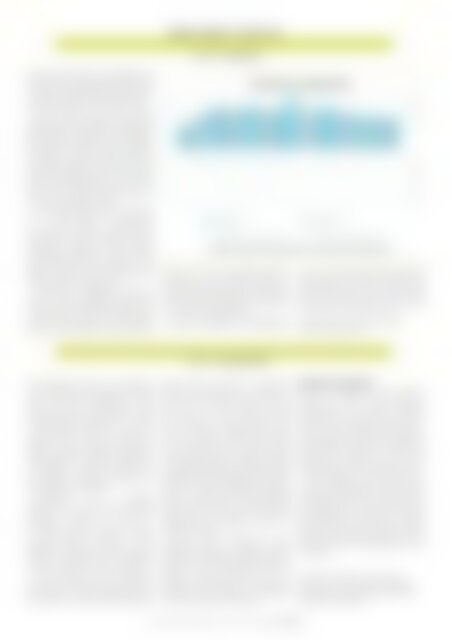CM May 2020
The CICM magazine for consumer and commercial credit professionals
The CICM magazine for consumer and commercial credit professionals
- No tags were found...
Create successful ePaper yourself
Turn your PDF publications into a flip-book with our unique Google optimized e-Paper software.
INSOLVENCY SPECIAL<br />
AUTHOR – Gareth Harris<br />
then we predict that the downward curve<br />
will be much steeper than the 1990’s and<br />
could be even steeper than in 2008, with a<br />
consequent double spike in insolvencies,<br />
now, and in say six to 12 months’ time.<br />
The Covid-19 crisis has caused<br />
economies across the globe to adopt selfdistancing<br />
as the de-facto international<br />
global public health policy to mitigate<br />
the spread of the disease. Unfortunately,<br />
that policy requires putting national<br />
economies on hold to save lives. Unlike in<br />
2008 when companies continued to trade,<br />
albeit with limited means, this time the<br />
taps have effectively been turned off, for<br />
most. This has likely ushered in the end<br />
of the current business cycle.<br />
There will therefore almost inevitably<br />
be a double spike in insolvencies<br />
as a result, despite the government<br />
intervention. The major banks face an<br />
unenviable balance between lending<br />
responsibly (arguably conservatively)<br />
and protecting their own futures, versus<br />
facing criticism for a lack of support. One<br />
thing is certain, the last thing we need<br />
now is another banking crisis.<br />
Predictions of 800,000 insolvencies<br />
seems a major exaggeration given that<br />
over the course of the 2008-13 period, the<br />
total corporate insolvencies were less than<br />
114,000. We are likely to see the impact<br />
first in London and the South where the<br />
effect of CV-19 has been felt the hardest.<br />
Sector wise, we are already seeing it in<br />
hospitality, travel and retail – where there<br />
several notable insolvencies have already<br />
been announced including Cath Kidston,<br />
Carluccio’s and Debenhams.<br />
For those companies who may be on<br />
the cusp of survival, it is vital that they<br />
Recession Comparison<br />
Graph: horizonal axis represents a 5.5-year period (22 quarters).<br />
act now and really take swift and often<br />
drastic measures wherever possible and<br />
effectively go into survival mode. They<br />
may still need some form of restructuring<br />
process on the way out of the recession<br />
but survive to trade another day.<br />
Gareth Harris is a partner of RSM<br />
Restructuring Advisory<br />
AUTHOR – David Kerr FCI<strong>CM</strong><br />
for individuals. Why not an acceleration<br />
of the introduction of planned breathing<br />
space (moratorium) proposals, so that<br />
those who are unfortunately made<br />
redundant (and there will still be many,<br />
notwithstanding furlough) can pause<br />
to take advice without the threat of<br />
bankruptcy? We have seen (just before<br />
going to press!) welcome forbearance<br />
for those already in Individual Voluntary<br />
Arrangements, providing opportunity<br />
for payment breaks, reductions in<br />
contributions, and greater IP discretion<br />
when dealing with defaults.<br />
Returning to corporate<br />
announcements, there are yet further<br />
measures to ensure that businesses<br />
becoming insolvent in, and as a<br />
consequence of, the crisis can continue<br />
to access essential supplies to keep<br />
operating. Keep a close eye on the<br />
definition of ‘essential’ as those suppliers<br />
could be prevented from terminating<br />
contracts solely on insolvency grounds.<br />
We are going to see a temporary<br />
suspension of wrongful trading rules for<br />
three months so that company directors<br />
can trade on and keep their businesses<br />
going without the threat of personal<br />
liability. The legislation is expected to<br />
cover the period from March. This has<br />
been done in other countries during<br />
the crisis, but it does come with a bit<br />
of a warning to credit managers. That<br />
threat of personal liability has helped<br />
to focus directors’ minds when faced<br />
with a financial crunch – advisors would<br />
always caution directors against carrying<br />
on trading beyond the point when they<br />
recognise that liquidation is likely. Putting<br />
liquidation off, and making the situation<br />
worse, has hitherto risked their personal<br />
wealth – removing the limited liability<br />
they ordinarily enjoy. But with this threat<br />
lifted, how can you be sure now that the<br />
company you are supplying is solvent and<br />
will be able to pay?<br />
Worth noting though that the<br />
theoretical risk of liability under<br />
fraudulent trading laws remains in place,<br />
as does the risk of director disqualification,<br />
subject to any ‘forbearance’ that the<br />
Business Department may adopt in its<br />
approach to such matters, in accordance<br />
with that which it has been advocating for<br />
IPs in the conduct of their work.<br />
INSOLVENCY VOLUMES<br />
One near certainty in these uncertain<br />
times is an increase in the number of<br />
insolvencies, way beyond anything<br />
predicted before coronavirus. The above<br />
measures may mitigate against this to<br />
some extent, but plenty of businesses<br />
are going under. Some of those may have<br />
been teetering on the verge of insolvency<br />
already (for example in retail), but<br />
unfortunately many otherwise solvent<br />
companies will be ruined irredeemably.<br />
The temporary stay that the new<br />
measures will bring about may help some<br />
businesses through the crises, but when<br />
we emerge from it, they will still have<br />
their debts to pay, and may have increased<br />
their liabilities. Any return to ‘normal’<br />
(whatever that may look like) could be<br />
gradual, and the deferral of debts in some<br />
cases may just be a postponement of the<br />
inevitable.<br />
David Kerr FCI<strong>CM</strong> is an insolvency<br />
practitioner with extensive regulatory<br />
experience and a member of the CI<strong>CM</strong><br />
Technical Committee.<br />
Advancing the credit profession / www.cicm.com / <strong>May</strong> <strong>2020</strong> / PAGE 13


















